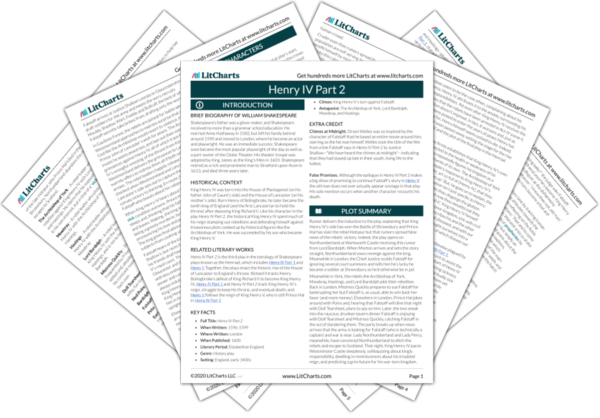Henry IV Part 1 presented warfare as meaningless bloodshed devoid of grandeur and so too does Henry IV Part 2 present war in an unfavorable light. Yet while Part 1’s extended, gruesome battle scenes illustrated war’s senseless violence, this play focuses on war’s other negative attributes. Henry IV Part 2 doesn’t feature any actual battles, but instead showcases the gross corruption and dishonorable cruelties that war inspires in people.
Falstaff merrily engages in ignoble fraud to profit at the expense of both military and civilian populations, once again taking bribes from recruits and stocking the army with pathetic excuses for soldiers to line his own pockets. The old man also plans to make off with a hefty military pension by pretending that his limp (caused by gout and venereal disease) is the result of battle wounds won in brave combat.
Falstaff may be the play’s clown, but serious characters are just as culpable of ignoble military practice. Lancaster only manages to defeat the rebel forces by resorting to underhanded tactics. He dupes the Archbishop of York, Mowbray, and Hastings into thinking he’s offering peace, then captures them right as they’ve let their guard down. Thus, despite the fact that the rebels are the play’s villains, the Archbishop, Mowbray, and Hastings actually act more honorably in war than Lancaster does.
King Henry IV, too, turns out to be a less than wholly noble warrior. The crusades through the Middle East that he has supposedly wanted to launch in the name of Christianity are, he reveals, motivated by much less high-minded reasons. In his final advice to Prince Hal, the king explains that foreign wars are simply the best way to distract one’s own subjects from rebellion, a perspective uncomfortably willing to sacrifice the lives of foreigners for the sake of one’s own ease at home. Further, the old king admits on his deathbed that his eagerness to attack the Middle East was always rooted in the childish desire to fulfill a personal prophecy. “It hath been prophesied to me many years, I should not die but in Jerusalem; which,” he laments, “vainly I suppos'd the Holy Land.”
Warfare ThemeTracker

Warfare Quotes in Henry IV Part 2
A man can no more separate age and covetousness than a' can part young limbs and lechery: but the gout galls the one, and the pox pinches the other; and so both the degrees prevent my curses. (198-200)

Unlock explanations and citation info for this and every other Henry IV Part 2 quote.
Plus so much more...
Get LitCharts A+Rumour doth double, like the voice and echo,
The numbers of the fear’d...
…Upon my soul, my lord,
The powers that you already have sent forth
Shall bring this prize in very easily. (99-103)
…we are all diseased,
And with our surfeiting and wanton hours
Have brought ourselves into a burning fever,
And we must bleed for it; of which disease
Our late king, Richard, being infected, died.
But, my most noble Lord of Westmoreland,
I take not on me here as a physician,
Nor do I as an enemy to peace
Troop in the throngs of military men;
But rather show awhile like fearful war,
To diet rank minds sick of happiness,
And purge the obstructions which begin to stop
Our very veins of life. (54-66)
I pawned thee none:
I promised you redress of these same grievances
Whereof you did complain; which, by mine honour,
I will perform with a most Christian care.
But for you, rebels, look to taste the due
Meet for rebellion and such acts as yours. (342-346)











